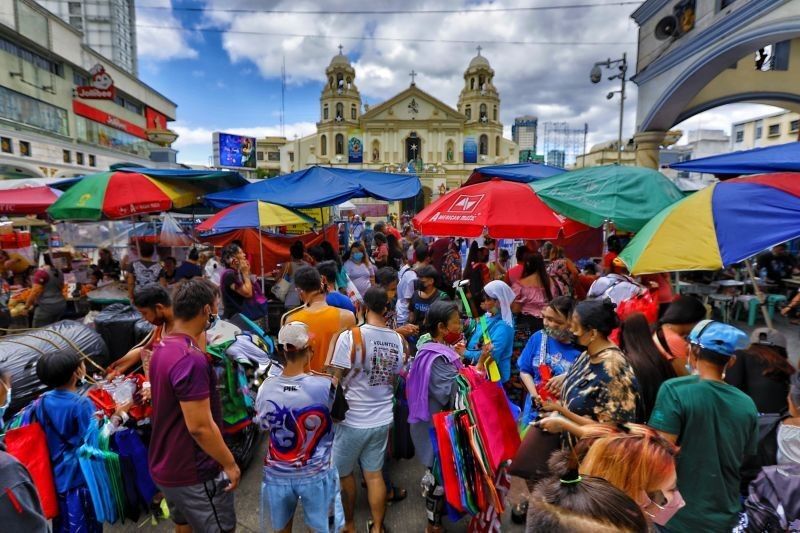Inflation back to target levels in December

MANILA, Philippines (Update 1, 11:52 a.m.) — Inflation eased in December, due in part to the slower change in prices of key consumer items, and fell back to the government's target.
Inflation, as measured in the consumer price index, picked up 3.6% year-on-year in December, the Philippine Statistics Authority reported Wednesday. This was lower than the 4.2% clip recorded in November and the lowest monthly reading this year.
Inflation in December fell within the Bangko Sentral ng Pilipinas’ forecast range of 3.5-4.3% for the month. But for the entire 2021, inflation averaged 4.5%, breaching the Duterte administration's target 2-4% annual target.
In a statement, the BSP said it would include the impact of Typhoon “Odette” into its forecasts once figures are available since the deadly storm’s aftermath would result in temporary price increase in the coming months.
"The supply disruptions and agricultural damages from typhoon Odette will likely result in a temporary uptick in the prices of food items and other necessities over the near term," the BSP said in a statement.
"The BSP will have to include the typhoon’s impact into its projections once firm estimates become available. At the same time, the implementation of reconstruction efforts and rehabilitation programs in areas damaged by the storm will be essential to support economic recovery and prevent job losses," it added.
At a press conference, National Statistician Claire Dennis Mapa noted that one of the biggest drivers of inflation this year was the prices of meat, especially pork. Domestic hog farmers saw their livestock infected by the African swine fever for most of the year, which led to government interventions such as price caps and loosening restrictions on frozen imported pork.
“Contributing to inflation in 2021 were prices of meat, such as pork, it was really high. Although prices decelerated in the previous, compared to the whole this was the biggest contributor,” Mapa said.
For his part, Socioeconomic Planning chief Karl Kendrick Chua said the government is doing its part to manage meat inflation, as meat prices rose to 11.3% in December from the 10.7% uptick in November. The National Economic and Development Authority is recommending the extension of Executive Order 133, which lowered minimum access volume limits for pork importation.
“To temper inflation in meat, especially pork, the government is working to increase local supply and ensure regular unloading of stocks from cold storages,” Chua said in a statement.
Data showed price growth moderated especially for “sin” products such as alcoholic beverages and cigarettes, which picked up at a slower pace of 6.5% on-year. Public transport costs inched up 6.1% year-on-year last motnh.
Meanwhile, utility costs such as rent, water, and power climbed 5%.
Nicholas Mapa, senior economist at ING Bank, said the milder inflation in December means the BSP can still afford to keep its ultra-loose monetary policy. But Mapa said the BSP’s room to keep historic-low rates steady is shrinking amid pressures from hawkish central banks in developed economies.
“Indications that the US Fed will likely be hiking rates by 3 or more times this year suggest that BSP may need to adjust its own policy stance, regardless of inflation or growth dynamics,” he said.
For Sanjay Mathur, ANZ Research chief economist for Southeast Asia, inflation may move at tolerable pace in the coming months.
“That said, some of the elements behind the December moderation are temporary. Of specific note is that with crude oil prices rising again, transport costs may harden. The typhoon is also likely to impact food costs,” Mathur added.
Moving forward, the inflation report in February will likely include the impact of the infection surge in Metro Manila and other areas, which have the potential to temper consumer demand. The PSA clarified that Odette’s impact was not ‘big,’ since areas outside the National Capital Region even saw prices of vegetables decline, slowing consumer inflation.
Jun Neri, lead economist at Bank of the Philippine Islands, expects base effects to have huge impact on inflation from January to March this year.
“First quarter 22 prints will probably be muted because of high base from meat and the redefinition of CPI weights. By the second quarter, the base effects could fade and bring inflation back above target again,” Neri said in a Viber message.
“Transitory has evolved to a new meaning it seems,” he added.
- Latest
- Trending




























